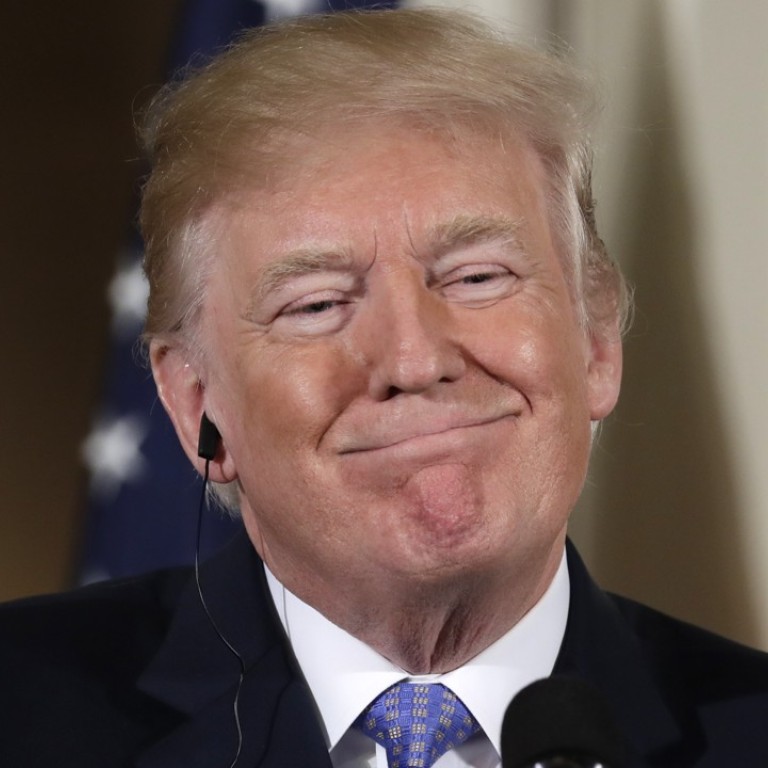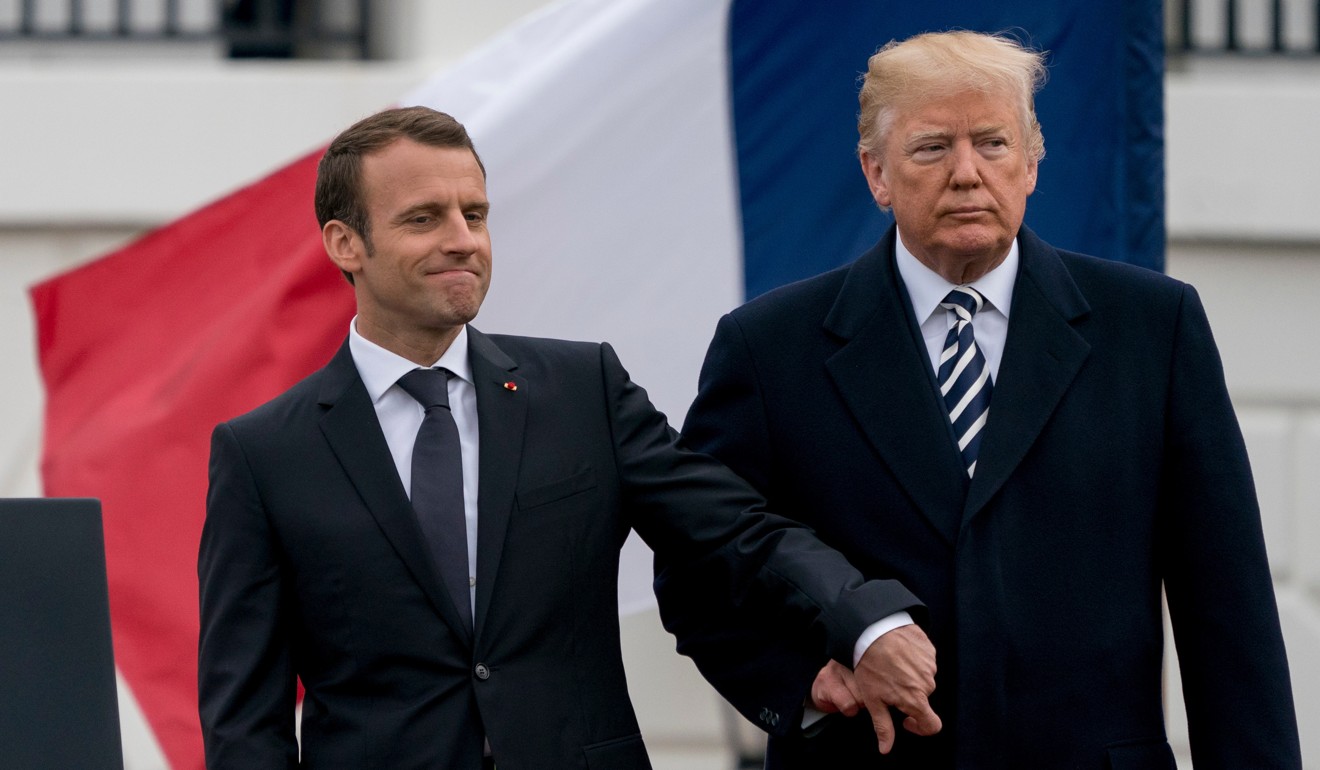
Donald Trump moves to claim credit for peace talks on Korean peninsula, taking aim at ‘those who failed so badly’
Trump credited the personal bond he forged with Chinese President Xi Jinping for fostering the rapid turnabout with North Korea
US President Donald Trump has placed himself at the centre of the remarkable summit between the leaders of North and South Korea, taking credit for bold and innovative diplomacy that may open a path to peace where other leaders failed.
“It’s certainly something that I hope I can do for the world,” Trump said. “This is beyond the United States. This is a world problem, and it’s something that I hope I’m able to do for the world.”
Trump said on Saturday that “things are going very well” after talking with South Korea’s President Moon Jae-in about his imminent summit with North Korean leader Kim Jong-un.
“Just had a long and very good talk with President Moon of South Korea. Things are going very well, time and location of meeting with North Korea is being set,” Trump wrote on Twitter. “Also spoke to Prime Minister [Shinzo] Abe of Japan to inform him of the ongoing negotiations.”
The dramatic turn of events on the Korean peninsula was the capstone to a week that crystallised the ways Trump has established his foreign policy approach as one that rests largely on the pride he takes in busting the old conventions of diplomatic negotiations and remaking them in his image. The world is adjusting.
This is beyond the United States. This is a world problem, and it’s something that I hope I’m able to do for the world
French President Emmanuel Macron and German Chancellor Angela Merkel visited the White House this week hoping to convince Trump not to abandon the Iran nuclear deal and to back off his protectionist trade policies. But by the time they left, both leaders had largely given up trying to convince Trump he was wrong and instead focused on how to work around their differences.
British Prime Minister Theresa May, who had been keeping Trump at arm’s length in recent months, defied the threat of mass protests this week to finally invite him to visit what is often called America’s closest ally.
And the Senate confirmed Mike Pompeo, a Trump political ally and former tea party congressman, to be secretary of state, giving the president a foreign policy team more in line with the international policies he promoted during the campaign.
Trump’s foreign policy manoeuvres, particularly on North Korea, carry great risks. Pyongyang has proven an unreliable negotiator in the past; a failure of talks now could inflame tensions back to where they were only months ago, when there were concerns that a military confrontation was becoming more likely. If he abandons the Iran deal, Trump will be under pressure to come up with a new approach to keeping Tehran’s nuclear ambitions in check.
And while Trump boasts that his tough trade talk is bringing countries to the negotiating table, congressional Republicans are openly fretting that potential trade wars will be disastrous for the economy and their party’s prospects in the midterm elections. But for now, the president is dismissing his critics as naysayers who have failed where he plans to succeed.
Watch: North and South Korean leaders pledge peace
“We get a kick every once in a while out of the fact that I’ll be watching people that failed so badly over the last 25 years explaining to me how to make a deal with North Korea,” Trump cracked during a White House news conference Friday with Merkel. “I get a big, big kick out of that.”
Trump has turned the traditional step-by-step process of major international negotiations on its head. He stunned some aides by agreeing on the spot to an offer of direct talks with Kim. The meeting casts Trump as the iconoclastic deal maker in chief – and he appears to relish the image.
“The United States in the past was played like a fiddle,” by North Korea, because Pyongyang could take advantage of a “different kind of leader,” Trump said Friday. “That’s not happening to us.”
Hours before, Kim had walked across the border to South Korea and a waiting embrace from South Korea’s Moon. Over an hourslong visit across the heavily armed border, Kim laid the foundations for a meeting with Trump, which is expected to occur as soon as next month. Kim has agreed that denuclearisation will be on the table.
Trump claims he has forced the issue through his tough stance on North Korea during his first year in office, and vowed that he will be a sharper negotiator than any of his predecessors.
Trump also credits the personal bond he forged with Chinese President Xi Jinping for fostering the rapid turnabout with North Korea, China’s Communist ally and economic lifeline.
“Everyone’s surprised at how tight he clamped down,” on North Korea, Trump said. “Everyone said that he’d just talk about it, he wouldn’t do it. Well, he did it, and he did it out of a relationship that we have.”

Trump also took credit for helping South Korea open the door for talks, through his support for the Winter Olympics held there in February. With Trump’s blessing, South Korea invited North Korea to send athletes and dignitaries, transforming the games into a spectacle of sports diplomacy after nearly 70 years of conflict and hostility between the two Koreas.
Senator Lindsey Graham, a frequent critic of Trump on foreign policy matters, sounded excited about the reversal on the Korean Peninsula after months of Twitter taunts and name-calling between Trump and Kim.
“We’re not there yet, but if this happens, President Trump deserves the Nobel Peace Prize,” Graham said Friday.
Merkel’s cordial afternoon visit Friday was brief by comparison with the three days of frills accorded Macron earlier in the week.
Merkel came to make a final argument to Trump that he should not break the 2015 nuclear deal with Iran, ahead of a May 12 deadline. Macron had already suggested that his own diplomacy had failed to sway Trump away from his opposition to what the president calls a “bad deal.”
Merkel was also making a practical argument for exempting Europe from new tariffs on steel and aluminium that would take effect on May 1.
Trump’s reasons for the tariffs are, like his views on the Iran deal, rooted in his populist world view – the “America First” campaign slogan put in action no matter the horrified complaints of allies and some in Trump’s own party.
That traditional allies had to come to him, asking for a change of heart on issues where the United States and Europe once walked in step, shows the ways in which Trump has rewritten the rules.
Watch: world leaders line up to meet Kim Jong-un
“The president will decide. That is very clear,” Merkel said. “We had an exchange of views on the current state of affairs of the negotiations, and the respective assessments on where we stand on this. And the decision lies with the president.”
Merkel leads Europe’s most populous country, and is the longest-serving leader among the major European powers – a mainstay of the kind of cautious consensus politics Trump instinctively rejects.
We’re not there yet, but if this happens, President Trump deserves the Nobel Peace Prize
But more than a year after their awkward first White House meeting, dominated by Trump’s pet peeve about German contributions to Nato that he considers paltry, Merkel seemed to have the hang of navigating policy disagreements with an American leader she must nonetheless court.
On Iran, she told reporters that she told Trump that, in her view, the current deal “is anything but perfect,” but she avoided any point-by-point examination of their differences.
Trump smiled as she moved to a discussion of Nato that addressed Trump’s complaint that the United States pays too much – in terms that he might have chosen himself.
“Germany and Europe have to take their destiny into their own hands, because we can no longer, as we used to during the period of the cold war, during the years when Germany was divided, rely on America coming and helping us,” Merkel said.
Trump, who is broadly unpopular in Germany, shrugged off a German reporter’s question about his “aggressive tweeting” and blunt diplomatic style.
“I believe that – you know, when I look at the numbers in Germany – and some other countries, they may not like Donald Trump but you have to understand, that means I’m doing a good job because I’m representing the United States,” he said.

